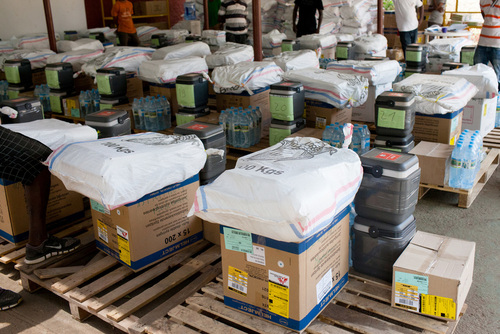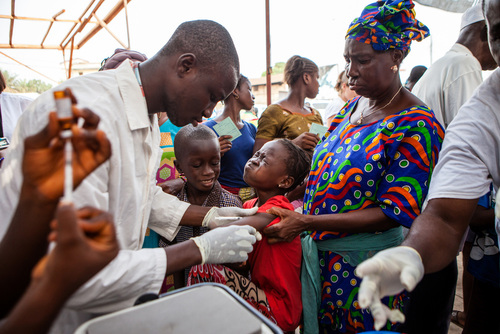Médecins Sans Frontières (MSF) is today launching a large-scale measles vaccination campaign in Conakry, in collaboration with of the Guinean ministry of Health. Since the beginning of the year, there have been 3,468 confirmed cases of measles in Guinea and it has caused 14 deaths. Conakry and Nzérékoré are the most affected districts.
Routine vaccination in Guinea was drastically reduced during the 2014-2015 Ebola epidemic, partly because attention and most resources were focused on Ebola management but mainly due to fear: people stayed away from health facilities, and vaccination activities were suspended because of infection risks. This left thousands of young children unprotected against easily preventable diseases. The authorities organised a nationwide vaccination campaign a year ago for children who had not received their shots (MSF did not participate to this campaign). Despite this catch-up effort, a measles epidemic was declared on 8 February 2017.
“The fact that a new epidemic occurs barely a year after a massive vaccination campaign is a worrying sign of the weakness of healthcare in Guinea,” deplores Ibrahim Diallo, MSF’s representative in Guinea.
“Major problems remain in the health system, undermining its capacity to prevent and respond to outbreaks in an effective and timely way.”
After the devastating Ebola epidemic that killed over 11,000 people and severely affected the health systems of the three most affected countries (Guinea, Sierra Leone and Liberia), the World Health Organization (WHO) and leading public health experts insisted on the importance of rebuilding responsive health systems in the three countries, equipping and supporting them to better manage similar or new health crises.
According to the UN body in charge of Ebola response, only 18 per cent of the funds disbursed to support the countries during the Ebola epidemic were meant for recovery. International donor commitments to strengthening health systems have focused on improving disease surveillance to ensure the early detection and response of outbreaks, such as Ebola.

Yet today, faced with a large outbreak of measles, only NGOs MSF (in Conakry) and Alima (in Nzérokoré district) are providing support to the Ministry of Health for the vaccination campaign in the worst affected districts. WHO and UNICEF have pledged support to other affected districts across the country, which is still under discussion.
“If Ebola was a wake-up call, since then the world seems to have fallen back asleep. As shown by this measles outbreak, the concrete impact of the promises of funding, support and training made during and after the Ebola crisis still remains to be felt by ordinary Guineans,” says Dr Mit Philips, MSF health policy analyst. “Access to good healthcare was clearly lacking before Ebola struck and today, the country is still facing today the same problems that it was facing then, largely alone, in spite of the international public commitments to build better and more responsive health systems.”
To contain the measles epidemic, MSF, with the Ministry of Health in Conakry, is mobilising 126 teams of 13 people, spread out across 164 vaccination sites in the city of three million people. All children aged from six months to 10 years will be vaccinated. MSF also supports 30 health centres in Conakry to care for children suffering from mild cases of measles, as well as the referral centre where severe cases are admitted to hospital.
MSF and Ebola response
From the very beginning of the recent Ebola epidemic, MSF responded in the worst affected countries – Guinea, Liberia and Sierra Leone – by setting up Ebola treatment centres and providing services such as care, psychological support, health promotion, surveillance and contact tracing. At the peak of the epidemic, MSF employed nearly 4,000 national staff and over 325 international staff to combat it across the three countries. MSF admitted a total of 10,376 patients to its Ebola management centres, of which 5,226 were confirmed Ebola cases.
MSF in Guinea
MSF has worked in Guinea since 1984 and has assisted in previous outbreaks of cholera and measles. It is currently providing HIV and TB services in collaboration with the Ministry of Health, supporting treatment to around 9,000 HIV patients. The organisation closed its Ebola-related activities supporting survivors last September in Guinea.
On measles
Measles is one of the most contagious viral diseases today: one infected person can contaminate up to 18 non-immunised people. Worldwide, an estimated 367 people, mostly children, die of measles every day, half of them in sub-Saharan Africa. Measles vaccination coverage of 95 per cent of a population prevents the occurrence of outbreaks and epidemics within it.



